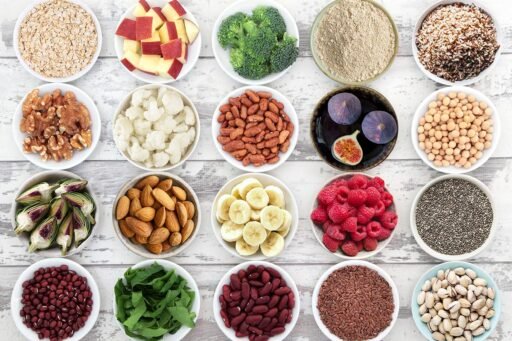1. Nutrient Density and Efficient Energy Production
Whole foods are rich in a variety of nutrients that are crucial for energy production at a cellular level. These nutrients include:
- Vitamins and Minerals: Many whole foods, such as leafy greens, fruits, and vegetables, are rich in B vitamins (like B6 and B12), which play a central role in converting food into energy. Without these vital vitamins, the body struggles to convert carbohydrates, fats, and proteins into usable energy. Other minerals, such as magnesium, which is found in nuts, seeds, and leafy greens, help facilitate energy production by participating in the synthesis of ATP (adenosine triphosphate)—the molecule that powers cells.
- Antioxidants: Fruits and vegetables, especially those with deep colors (like berries, spinach, and peppers), contain high levels of antioxidants. These compounds help neutralize free radicals that can cause oxidative stress. By reducing oxidative stress, antioxidants protect cells from damage and allow them to function more efficiently, contributing to improved energy levels.
The synergy of these nutrients in whole foods helps maintain a constant, efficient energy supply by ensuring that every cell in your body has access to the tools it needs to produce energy.
2. Stable Blood Sugar Levels
One of the main causes of energy crashes during the day is fluctuations in blood sugar levels. When you consume processed foods that are high in refined sugars and simple carbohydrates, your blood sugar spikes quickly and then crashes, leaving you feeling lethargic and drained.
Whole foods, particularly those rich in fiber like whole grains (oats, quinoa, brown rice), legumes (beans, lentils), and vegetables, have a much lower glycemic index. This means they are digested more slowly, leading to a gradual release of glucose into the bloodstream. As a result, your blood sugar levels remain stable, and you experience sustained energy throughout the day.
For example, eating a bowl of steel-cut oats with some fruit in the morning provides complex carbohydrates that are digested slowly, providing a steady supply of glucose to your brain and muscles. This contrasts sharply with a sugary breakfast, like a donut, which may give you a quick burst of energy followed by an energy slump.
3. Inflammation and Fatigue
Chronic inflammation is often linked to feelings of tiredness and fatigue. Inflammation in the body can disrupt normal processes and deplete energy reserves. Many processed foods, particularly those high in refined sugars, trans fats, and artificial additives, contribute to increased levels of inflammation in the body.
Whole foods, on the other hand, contain anti-inflammatory compounds that help combat this issue. For instance, omega-3 fatty acids, which are found in fatty fish like salmon, walnuts, and flaxseeds, have been shown to reduce inflammation. These healthy fats also support brain function, joint health, and heart health, which can all contribute to higher energy levels.
Additionally, foods rich in polyphenols—like berries, dark chocolate, and green tea—have strong anti-inflammatory effects and protect the body against oxidative stress. By minimizing inflammation, whole foods can help you feel more energetic and focused.
4. Digestive Health and Energy Absorption
Digestive health plays a significant role in how efficiently your body extracts energy from the foods you eat. Poor digestion, often caused by a diet high in processed foods, can lead to bloating, sluggishness, and nutrient malabsorption, leaving you feeling fatigued.
Whole foods, especially those rich in fiber, promote a healthy digestive system by supporting regular bowel movements and ensuring that nutrients are absorbed effectively. For example, fiber from vegetables, fruits, legumes, and whole grains aids in digestion and keeps your gut microbiome balanced. A healthy gut microbiome is crucial for absorbing essential nutrients, including those needed for energy production, like B vitamins and magnesium.
Moreover, consuming whole foods supports the production of beneficial gut bacteria, which are linked to improved energy metabolism and overall health. The fiber in whole foods also acts as a prebiotic, nourishing these bacteria and allowing them to thrive.
5. Hydration and Energy
Water is essential for many of the body’s energy-producing processes, and dehydration can lead to fatigue and decreased concentration. Many whole foods, particularly fruits and vegetables, have a high water content. For example, watermelon, cucumbers, oranges, and celery are not only rich in vitamins and minerals but also help keep your body hydrated.
Staying hydrated helps maintain optimal circulation, supports digestion, and ensures that nutrients can be transported throughout the body efficiently—all of which contribute to better energy levels.
In contrast, processed foods, which often contain high levels of sodium and preservatives, can cause the body to retain water, leading to bloating and discomfort. This can drain your energy and make you feel sluggish.
6. Healthy Fats and Sustained Energy
Whole foods that provide healthy fats, such as avocados, olive oil, nuts, seeds, and fatty fish, are an excellent source of sustained energy. Unlike the quick burst of energy you might get from carbohydrates, fats are a more long-lasting fuel source.
Your body uses fats to produce ATP, which provides energy for long-term physical activities and brain function. Healthy fats are particularly important for maintaining mental clarity and focus, preventing the afternoon energy slump that many people experience. The brain itself is composed of about 60% fat, and ensuring that you consume adequate amounts of healthy fats helps keep your brain functioning optimally.
Moreover, fats help regulate hormones that are involved in appetite and energy management. For example, omega-3 fatty acids can help regulate insulin sensitivity, which in turn helps stabilize energy levels by ensuring that your body processes glucose efficiently.
7. Balanced Macronutrient Intake
One of the most important benefits of whole foods is their balanced ratio of macronutrients—carbohydrates, proteins, and fats. A diet focused on whole foods naturally provides an ideal mix of these macronutrients, which is crucial for maintaining stable energy throughout the day.
- Carbohydrates from whole grains, legumes, and vegetables provide the body with immediate fuel, but when consumed in their whole form, they release energy slowly, providing sustained fuel over time.
- Proteins from lean meats, beans, and legumes help repair tissues and maintain muscle mass, which is important for overall vitality and stamina.
- Fats from sources like avocados, nuts, and seeds provide long-term energy and support brain function.
By combining these macronutrients in balanced proportions, whole foods support your body’s ability to use energy efficiently, preventing spikes and crashes that can lead to fatigue.
8. Improved Sleep and Energy Cycle
Eating a diet based on whole foods can also improve your sleep, which in turn enhances your daytime energy. Processed foods, particularly those high in sugar and refined grains, can interfere with sleep patterns by causing blood sugar spikes and crashes, which affect hormone production (like cortisol and melatonin).
Whole foods—particularly those that contain magnesium (found in leafy greens and nuts) and tryptophan (found in turkey and seeds)—support better sleep by helping the body relax and regulate sleep-wake cycles. A good night’s sleep is critical for replenishing energy stores and ensuring you wake up feeling refreshed and ready for the day.
Conclusion: The Comprehensive Benefits of Whole Foods on Energy
Incorporating more whole foods into your diet is a powerful way to improve your energy levels, boost your physical and mental performance, and promote overall health. Whole foods provide the nutrients, hydration, and balance your body needs to operate at its best. They help stabilize blood sugar levels, reduce inflammation, enhance digestion, and provide long-lasting fuel, all of which contribute to a more consistent and sustainable source of energy throughout the day. By choosing whole, nutrient-dense foods over processed options, you’re giving your body the tools it needs to thrive and perform at its optimal energy levels.
































Pingback: sildenafil 50 mg for sale